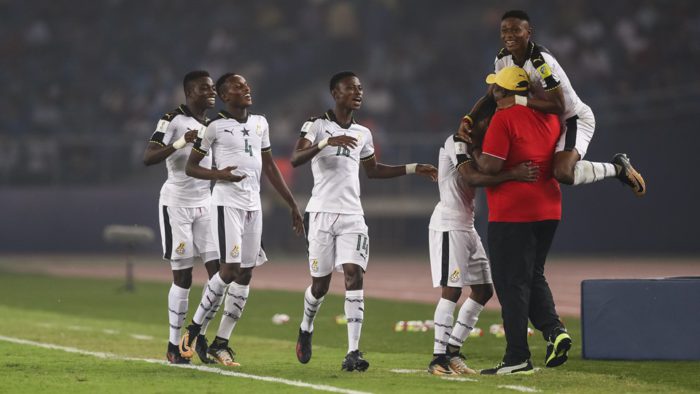India finally hit the wall on Thursday.
In the 87th minute of their match against Ghana, the spirit which had seemed to define their campaign at the U-17 World Cup visibly seemed to depart. Ibrahim Sulley's shot beat a prostrate Dheeraj Singh, rebounded off the pole but only as far as Emmanuel Toku, who blasted away at an empty net. Extravagant celebrations followed the extravagant strike. 0-4 the giant screens at the Jawaharlal Nehru Stadium read. The 11 players on the field didn't look up. They stood still, waiting for their victors to finish their reverie. Their teenage faces were haggard, shoulders sunken, and as they gulped down huge mouthfuls of the smoggy Delhi air, they almost certainly looked as if they just wanted it to be over.
In their two previous Group A matches, they had punched far above their weight against USA and Colombia. Through fighting losses, a brave Indian side had proved against established footballing nations that they had deserved to compete at this level. They had brought joy to a generation of football fans in the country. However, on what would be their final game of the World Cup, against Ghana, India would learn the limits of how far courage and sheer determination would carry them. Despite how far their journey had taken them, they would be reminded of the vast gulf that remained between them and the best of world-class competition.
India had been a bit unlucky in the previous games: they had been within sniffing distance of parity, strikes had struck the posts and goals had been struck on the counter. Their 4-0 loss against a physically and technically superior Ghana was not an unfair result. The numbers would suggest just how dominant the African side had been. They enjoyed 65 per cent possession, had 27 shots on goal with 10 on the mark as opposed to the hosts who had 10 attempts on goal with two at the target.
Buoyed by a record crowd of 52,614 -- the biggest in the tournament so far -- India had started fast and bold. A day before they had held out hope that they could somehow overturn a 0-4 goal difference, against a side that had finished runners-up at the African qualifiers. There had been moments when that faint belief seemed to be justified. A corner was won inside the first minute. Luck seemed to favour the hosts too. In the sixth minute Eric Aiyah was inexplicably ruled offside when Ghana were three against one against the Indian goalkeeper.
It was a brave hope but one that was steadily pulled apart at the seams. Ghana had scored only once in the competition until the game against India but grew increasingly confident. They separated themselves in the 43rd minute. Sadiq Ibrahim's cross was parried by Dheeraj only as far as Aiyah, who struck home the rebound.
India went into the break 1-0 down but what might have appeared to be a close battle was actually anything but. In the dressing room the players were exhausted. "They looked like they had been playing for 90 minutes," coach Luis Norton de Matos said later.
It was cruel position to be in. After two games against USA and Canada -- bigger and stronger teams -- the side was on the brink of their physical limits. Midfielder Amarjit Kiyam and defender Anwar Ali had been carrying injuries but had chosen to play. Goalkeeper Dheeraj appeared to be down for the count in the last few minutes of the first half but willed himself to stay in the fray.
In Ghana they found themselves against a side that was the toughest yet. "I knew we would suffer in the third game," De Matos said. "We cannot play three matches in seven days against opponents of this quality." And while India was on the brink of exhaustion, Ghana looked like they could have likely played another match if they had to.
The second goal came eight minutes in the second half when Aiyah, who had been ineffective throughout the tournament, completed a brace. Amarjit was replaced shortly afterwards, followed by Nongdamba Naorem. The structure that the team had resolutely stuck to was coming apart. The hero of the last match, Jeakson Singh, was responsible for conceding the third in the 86th minute when he was dispossessed inside his half by Gabriel Leveh, who in turn provided the assist to Richard Danso. Another dispossession two minutes later saw Emmanuel Toku get on the scoresheet.
The last two strikes could nearly entirely be blamed on poor decision-making caused by exhaustion. This was not a matter of India bringing out a new drawing board and plotting a change of formation or tactics. There was a gulf in size, strength, fitness and technique that they couldn't hope to bridge. Certainly not over the course of four years, which actually was how long this team had to compete at the world stage. "You are not a country of football," De Matos would say bluntly. "This culture must be introduced in all people. You need to start the process of football. Don't expect this country to compare against Ghana."
Even as De Matos spoke, Ghanaian players could be heard singing victory songs as the ascended the team bus. It was a cruel if unintentional jibe. It is one that De Matos said was to be expected. "This is top-level football," he said. "This is part of the process of growing up. The experience is to suffer goals. We need that to progress."
By Jonathan Selvaraj in New Delhi
